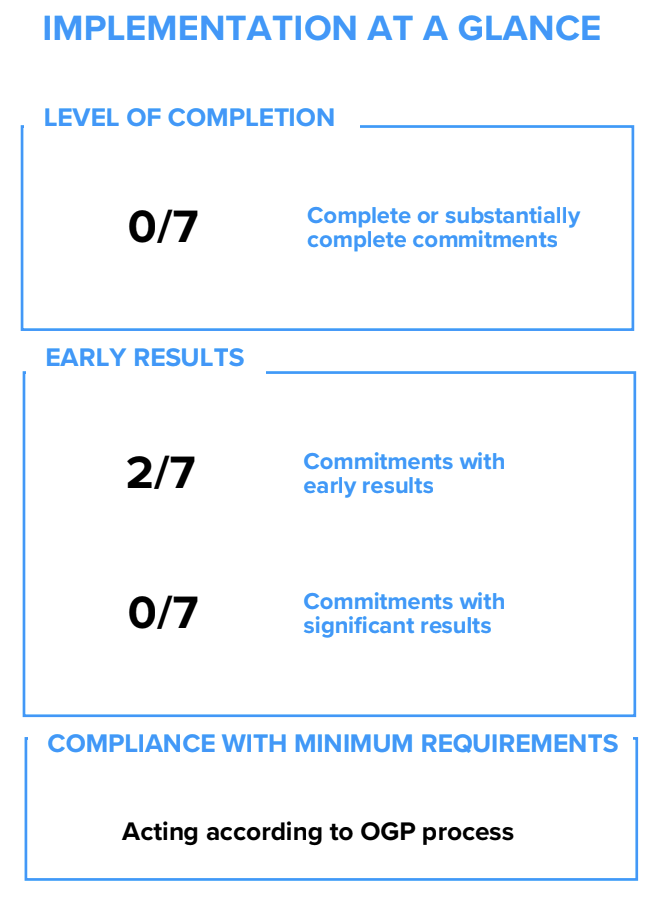Jamaica Results Report 2021-2023
Jamaica’s first action planAction plans are at the core of a government’s participation in OGP. They are the product of a co-creation process in which government and civil society jointly develop commitments to open governmen... shows mixed results with an overall limited level of completionImplementers must follow through on their commitments for them to achieve impact. For each commitment, OGP’s Independent Reporting Mechanism (IRM) evaluates the degree to which the activities outlin... More and moderate early resultsEarly results refer to concrete changes in government practice related to transparency, citizen participation, and/or public accountability as a result of a commitment’s implementation. OGP’s Inde... More in two out of seven commitments. Difficulties in attracting sufficient human and financial resources as well as declining stakeholder engagement during implementation will need to be addressed to advance the reforms outlined in the action plan.
 Early results
Early results
Two of the seven commitments in Jamaica’s first action plan achieved moderate early results. CommitmentOGP commitments are promises for reform co-created by governments and civil society and submitted as part of an action plan. Commitments typically include a description of the problem, concrete action... 3, aimed at amending the Access to Information Act, was identified as promising in the Action Plan Review and contributed to a moderate shift towards revitalizing this policy area. Commitment 6 refreshed the policy framework of climate change policy by incorporating stakeholder consultation despite not being assessed promising initially. The implementation of the other three commitments (2, 5 and 7) that had been considered promising in the Action Plan Review was generally stalled by a lack of human and financial resources and, in particular, by substantial delays experienced by the implementing agencies in hiring the external consultants needed to carry out several key activities. As a result, they did not achieve significant early results.
Completion
The commitments in this action plan covered five priority policy areas that were jointly agreed upon by the Government of Jamaica and civil society stakeholders: justiceTo address barriers that prevent citizens from having their justice needs met, OGP participating governments are working to expand transparency, accountability, and inclusion into all systems of justi... and human rightsAn essential part of open government includes protecting the sacred freedoms and rights of all citizens, including the most vulnerable groups, and holding those who violate human rights accountable. T..., natural resources, environment and climateIn the face of intensifying climate change, OGP participating governments are using their action plans to increase transparency of environment-related information, ensure public oversight of climate f... More, access to information, and youthRecognizing that investing in youth means investing in a better future, OGP participating governments are creating meaningful opportunities for youth to participate in government processes. Technical ... More. The Action Plan also included two commitments on anti-corruption and open dataBy opening up data and making it sharable and reusable, governments can enable informed debate, better decision making, and the development of innovative new services. Technical specifications: Polici... based on initiatives that were already underway by the government.
Commitment 2 on strengthening Jamaica’s open data system, Commitment 4 on building an open justiceAn open, independent, and impartial justice system serves as a foundation for better access to justice by fulfilling all people’s civil liberties and allowing individuals to more effectively protect... data portal, and Commitment 7 on improving access to information on policies targeting youth recorded some level of progress in terms of internal processes needed to achieve the foreseen milestones but did not generate tangible and publicly accessible results and were invariably reported by responsible implementing agencies as being delayed or stalled. Commitment 3 on access to information and Commitment 6 on climate change achieved a limited degree of completion but nevertheless managed to deliver moderate early results. Reliance on external consultants to provide inputs on the implementation of commitments was a common factor that stalled progress in most of the commitments. As such, future action plans would benefit from optimizing the existing capacity within government agencies.
Participation and co-creation
Jamaica’s OGP process is overseen by the Ministry of Finance and the Public Service (MOFPS). A multistakeholder forum (MSF), established in 2021, served as the primary institution responsible for guiding and managing OGP engagement. The MSF comprised six representatives each from government and civil society and was led by government and civil society co-chairs. Despite non-governmental actors having significant influence over the co-creation agenda, in particular through the identification of priority commitment areas and involvement in the MSF, their engagement declined over time.[1] This uneven level of participation and collaboration had a negative impact on the overall quality of stakeholder engagement throughout implementation.
Implementation in context
The implementation of this action plan was affected by difficulties most implementing agencies faced in securing sufficient human and financial resources needed to deliver the activities in time. Many of these activities faced delays in the procurement of external consultants to provide key inputs that were essential for the commitments to meet implementation schedule. This was compounded by the fact that some of the commitments included a large number of planned activities and deliverables.
[1] Lorris Jarrett (Deputy Financial Secretary) and Richard Lumsden (Director of the Economic Reform Monitoring Unit) of the Ministry of Finance and the Public Service, interview by IRM researcher, 10 October 2023; Matthew McNaughton (SlashRoots Foundation & Member of the Multistakeholder Forum), interview by IRM Researcher, 4 April 2024.

Leave a Reply